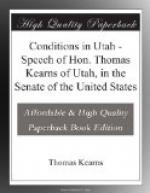Not long since two men, who for many years had been tithe payers and loyal members of the church, undertook to establish a salt garden along the line of a trunk railway. One of them was a large dealer in salt, and proposed to extend his trade by making the salt and reaching territory prohibited to him by the church price of salt; the other was the owner of the land upon which it was proposed to establish the salt garden. These men formed a corporation, put in pumping stations and flumes, and the corporation became indebted to one of the financial institutions over which the church exercised considerable influence. Then the president of the church sent for them. There is scarcely an instance on record where a message of this kind failed of its purpose. These men went to meet the prophet, seer, and revelator of God, as they supposed, but he had laid aside his robes of sanctity for the moment and he was a plain, unadorned, aggressive, if not an able, business man. He first denounced them for interfering with a business which he had made peculiarly his own; and, when they protested that they had no intention to interfere with his trade, but were seeking new markets, he declared in a voice of thunderous passion that if they did not cease with their projected enterprise, he would crush them. They escaped from his presence feeling like courtiers repulsed from the foot of a king’s throne, and then surveyed their enterprise. If they stopped, they would lose all the money invested and their enterprise would possibly be sold out to their creditors; if they went on and invested more money, the president had the power, as he had threatened, to crush them. Not only could he ruin their enterprise, but he could ostracise them socially and could make of them marked and shunned men in the community where they had always been respected.
Is there menace in this system? To me it seems like a great danger to all the people who are now affected, and therefore of great danger to the people of the United States, because the power of this monarchy within the Republic is constantly extending. If it be an evil, every apostle is in part responsible for this tyrannical course. He helped to elect the president; he does the president’s bidding, and shares in the advantages of that tyranny.




